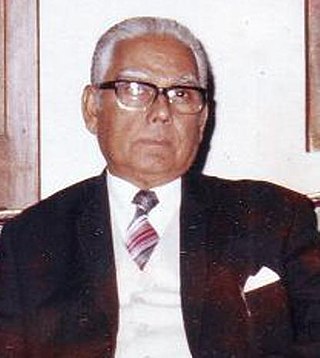
Syed Sajjad Ali Shah was a Pakistani judge who served as the 13th Chief Justice of Pakistan from 4 June 1994 to 2 December 1997. He had been appointed as Chief Justice of the Supreme Court by Benazir Bhutto. Prior to that, he served as the 6th Chief Justice of Sindh High Court from 13 December 1989 to 4 November 1990.

The Supreme Court of Pakistan is the apex court in the judicial hierarchy of the Islamic Republic of Pakistan.

Nazim Hussain Siddiqui a Pakistani jurist who served as Chief Justice of the Supreme Court of Pakistan, from 31 December 2003 to 29 June 2005.

Ali Ahmed Fazeel was a Pakistani Attorney General.

The judiciary of Pakistan is the national system of courts that maintains the law and order in the Islamic Republic of Pakistan. Pakistan uses a common law system, which was introduced during the colonial era, influenced by local medieval judicial systems based on religious and cultural practices. The Constitution of Pakistan lays down the fundamentals and working of the Pakistani judiciary.

The chief justice of the Federal Shariat Court of Pakistan heads the Federal Shariat Court of Pakistan. The chief justice of the Shariat Court is the second-highest judicial office in the country, after the chief justice of Pakistan.
Justice Abdul Jabbar Khan was the 6th Speaker of the National Assembly of Pakistan. He was preceded by Fazlul Qadir Chaudhry.

Nasir Aslam Zahid ; Barrister-at-Law, is a Pakistani judge who served as the Chief Justice of the Sindh High Court and then a judge of the Federal Shariat Court of Pakistan and Supreme Court of Pakistan.

The High Court of Sindh is the highest judicial institution of the Pakistani province of Sindh. Established in 1906, the Court situated in the provincial capital at Karachi. Apart from being the highest Court of Appeal for Sindh in civil and criminal matters, the Court was the District Court and the Court of Session in Karachi.
Ahmed Hussain A. Kazi Tamgha-e-Pakistan Award was a civil servant of Pakistan and senior advocate of the Pakistan Supreme Court, who shaped the internal revenue, economic and industrialization policies during the 1970s.

Haziqul Khairi was a Pakistani jurist and author who served as Chief Justice of the Federal Shariat Court of Pakistan, Judge of the Sindh High Court, Ombudsman of Sindh and Principal of Sindh Muslim Law College. He was the grandson of eminent British India social reformer, Allama Rashid ul Khairi.

Aftab Ghulam Nabi KaziSPk, SK, also known as AGN Kazi, was a Pakistani civil servant and a bureaucrat during the Cold War and during the post cold war. Kazi was born in Sindh, Bombay Presidency, in 1919 to an academic family. He started his career in the Indian Civil Service in 1944 and served as the Deputy Commissioner of Bihar and Orissa. After the partition of India, Kazi migrated to Pakistan and joined the Provincial Government of Sindh, and held positions such as Secretary of Finance and Secretary to the Governor.

The Peshawar High Court is the provincial and highest judicial institution of Khyber Pakhtunkhwa in Pakistan. It is located in the provincial capital Peshawar. The Parliament passed a bill extending the jurisdiction of the Supreme Court (SC) and the Peshawar High Court to Federally Administered Tribal Areas (FATA), one of a handful of reforms paving the way for a merger of the tribal areas with Khyber Pakhtunkhwa.

The Sindh Muslim Government Law College or S. M. Law College is one of the oldest law schools of Pakistan, situated in Karachi, Sindh. The college has produced numerous notables including Chief Justices of Pakistan, Chief Justices of Federal Shariat Court, Chief Ministers of Sindh, Federal Ministers, and many judges of the Supreme Court of Pakistan and Sindh High Court.
Garhi Yasin Sindh is a town and taluka of Shikarpur District, Sindh, Pakistan.
Sindhi Pathan is the name of Pashtun communities living in Sindh for centuries that have adopted the norms and culture of Sindh.

Justice Bashir Ahmed Ghulam Nabi Kazi better known as Justice B G N Kazi (1921–1986) was the younger son of Khan Bahadur Ghulam Nabi Kazi a veteran educationist of British India, and a renowned jurist of Pakistan.

Justice Mushtak Ali Kazi, was a Pakistani jurist and writer, who served as a Judge of the High Court of Sindh and Balochistan.

Mir Hazar Khan Khoso was a Pakistani jurist who was the caretaker prime minister of Pakistan from 25 March to 5 June 2013. Khoso was a judge who previously served as the chief justice of the Federal Shariat Court and served as the caretaker prime minister ahead of the general elections scheduled in May 2013.
The Kyber Pakhtunkhwa Judicial Academy is an institution of higher learning in Peshawar, Pakistan which focuses on legal and judicial studies. Its mission is "to change the attitude of young law graduates as judges and to inculcate in them patience, sobriety, confidence, discipline and skill of high quality legal reasoning; to develop their capacity; to enable them to create harmony among all justice sector institutions; to sensitize them to the rights of all litigant public, notably, of the vulnerable communities; and to make them leaders to contribute to the rule of law.













